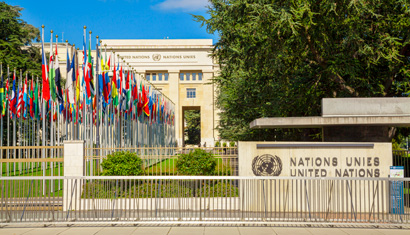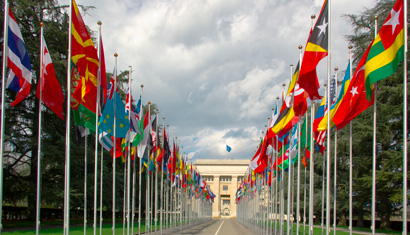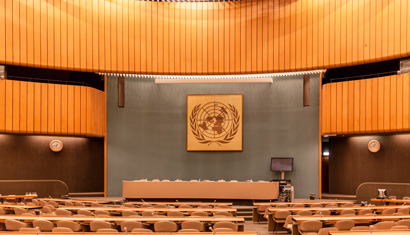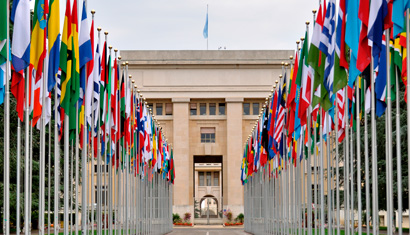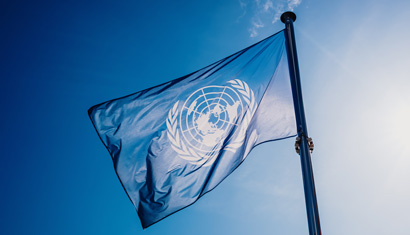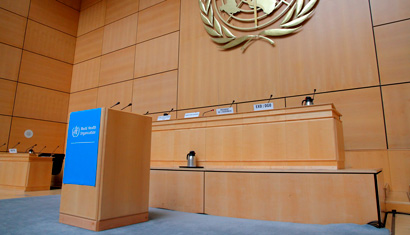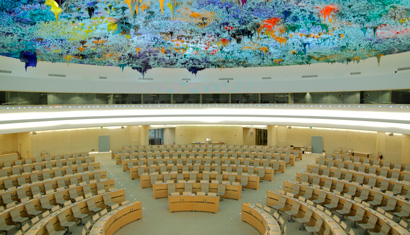Legal accountability of non-State actors for human rights violations abroad: Developments in Geneva
Legal accountability of non-State actors for human rights violations abroad: Developments during March 2014 in Geneva
‘No work, no water, no school, no temple. Just malaria’ is how one Cambodian villager described their situation after some 1,100 families were evicted from their lands to make way for a huge casino in the Botum Sakor National Park.
The Chinese developer, Union Development Group, bulldozed the lands, destroyed the rice fields and set fire to the houses of those who had refused the pitiful compensation amounts offered[1] leaving the affected villagers with nothing. In the same month we heard of forced relocations in Sierra Leone of hundreds of families from verdant agricultural land causing loss of livelihoods and poverty, carried out by London-based African Minerals Limited and the government.[2] In the vast majority of cases of cross-border human rights abuses by non-State actors, there is no accountability and the victims receive no redress.
In the face of widespread impunity for such human rights abuses NGOs, including the GI-ESCR, victims and States, are calling for non-State actors to be bound by enforceable legal obligations to comply with human rights standards. This is being pursued from two different angles in the human rights system and both received close attention this month in Geneva.
First, in relation to States, many are calling for recognition of the existing extra-territorial obligations of States under human rights treaties – ie. International law obligations to persons outside a States’ territory. This is accepted by many States and confirmed by jurisprudence from a number of treaty bodies and the International Court of Justice.[3] Regarding corporate activities abroad, the extra-territorial obligation to protect obliges States to ensure that businesses incorporated or domiciled within their jurisdiction do not violate human rights abroad. Furthermore, States have extra-territorial obligations to respect, protect and fulfil human rights abroad including through decisions made as part of inter-governmental organisations including international financial institutions (such as the World Bank and the European Bank for Reconstruction and Development[4]).[5]
Second, there is a strong push for greater accountability of business actors for human rights abuses through a binding international legal instrument (a treaty) and increasing frustration with the slow pace of implementation and unenforceability of the UN Guiding Principles on Business and Human Rights.
At the Human Rights Council and the Human Rights Committee these issues were under discussion this month and they are likely to continue to create much interest and excitement in the months leading up to the June session of the Council when the mandate of the Working Group on business and human rights is due to be renewed and as the issue of extra-territoriality is brought before several treaty bodies.
Extra-territorial obligations
The Human Rights Committee during its review of the US this month again challenged the US to abandon its legally flawed position of denying the extra-territorial application of the ICCPR. The US delegation maintained its position that the treaty (Article 2.1) should be interpreted to mean that States have obligations only in respect of persons within its jurisdiction AND territory and that the drafting history of the treaty supported that view. The US is particularly sensitive because of the implications for its Guantanamo Bay prison and recent controversies over its NSA cross-border telecommunications surveillance program. A New York Times article[6] which discussed a leaked legal memo from a former senior US State Department lawyer advising against the US position enlivened the issue giving the Committee further ammunition.
Mr Kaelin[7] challenged the US asking: whether the delegation recognised that its position on extraterritoriality allowed it to commit violations everywhere except in its own territory?; and whether it agreed that the non-applicability of the Covenant to extraterritorial activities was a dangerous position to take as it leads to impunity for rights violations? [8] The Committee’s conclusions[9] which came out today reiterated its ‘regret’ at the US’s position and called on the US to ‘interpret the Covenant in good faith’ and ‘acknowledge [its] extra-territorial application’.
The Human Rights Committee has already issued concluding observations on the issue of home State regulation of transnational corporations in the context of a German company operating a coffee plantation in Uganda which was implicated in the violent forced eviction of 2,000 villagers and the destruction of their homes and property.[10] Just recently the ICESCR Committee also affirmed extra-territorial obligations in its conclusions on Norway which urged it to ensure that investments in foreign companies operating in third countries made by the Norway Government pension fund are subject to a comprehensive human rights impact assessment and to adopt measures to prevent human rights contraventions abroad by corporations which are domiciled in Norway. In relation to Austria the Committee called upon the State to adopt a human rights-based approach to its policies on official development assistance and on agriculture and trade, through human rights impact assessments, including ensuring that there is an accessible complaint mechanism for victims in receiving countries.[11]
Push for a treaty on transnational corporations
In the same week, Ecuador and South Africa hosted a side event at the Council to discuss the idea of a binding treaty on transnational corporations. There was a lot of interest from both States and NGOs. Those hoping for some detail as to the content or coverage of a treaty and its possible enforcement mechanism were disappointed as the event aimed more at scoping political support. States’ positions generally lined up along Global South / North divisions with Ethiopia, Cuba and Bolivia voicing their support for a TNCs treaty, and Ireland and the European Union urging States to give the Guiding Principles more time to be implemented and to work to improve the functioning of the Working Group on business and human rights. The latter States drew attention to current efforts to implement the Guiding Principles, such as National Action Plans and the EU Initiative on conflict minerals and cautioned against diverting attention and efforts towards a treaty at the expense of implementation of the GPs. The EU representative urged States to ‘cherish what we have’ in the GPs pointing out the long and difficult history in achieving consensus on the GPs resolution.
Cautions also came from Dr Michael Addo on behalf of the Working Group and Mr John Knox, Special Rapporteur on the Environment, that a treaty might not be the silver bullet that some are suggesting A similar position was taken by Professor John Ruggie[12] is his recent Issues Brief.[13] They point to the long negotiation period for any new treaty, a number of previous failed attempts to agree binding principles in this area[14] and the question of whether the most pertinent host States (eg: the US, Canada, the UK and European States) are likely to ratify a TNCs treaty in any event. Mr Addo gave a strong defence of the Working Group’s work and the GPs. Mr Knox rightly identified the key problem as enforcement and access to remedies. He suggested, in a similar vein to Ruggie, a more focused, and therefore achievable, treaty exercise which did not attempt to be all encompassing but focused on finding solutions to a part of the problem.
In the meantime, Norway is busy consulting with States and NGOs to see what support it has for its June resolution and to what extent this push for a TNCs treaty might undermine its aim for a consensus resolution on the business and human rights mandate.
Hopefully the two processes are not construed as mutually exclusive and can advance side by side. A treaty is a very important long-term goal, whereas the Guiding Principles are currently operational and amendable to further work on improving and strengthening their content. Strengthening the Guiding Principles, including having them incorporate the recognized extra-territorial obligations of States to protect rights abroad, could prove to be particularly critical if, as is plausible, an inter-governmental treaty process takes the Guiding Principles as its normative starting point or baseline.
The recently released OHCHR commissioned report on ‘Corporate liability for gross human rights abuses: Towards a fairer and more effective system of domestic law remedies’[15] also weighs into the debate. The report pursues the Ruggie suggestion of focusing on ‘gross human rights violations’ and will be critiqued for this narrowing. Further, whilst the report ‘does not make any case for extraterritorial solutions over local solutions (or vice versa)’[16] it is sceptical, finding:
First it is not yet clear that, in relation to business and human rights, close convergence of legal standards and procedures is a desirable, let alone feasible, project. Second, there would be immense implementation difficulties associated with a treaty aimed at addressing the full range of gross human rights abuses, and all the contexts and circumstances in which they potentially arise. Finally, such a solution is unlikely to overcome many of the most serious barriers to remedy....[17]
The Report identifies extraterritoriality issues as a barrier to access to remedy[18] however it points out the legally flawed suggestion in the Guiding Principles that States do not have treaty obligations to regulate the extra-territorial activities of businesses domiciled in its territory.[19] Therefore an important part of the work to strengthen the Guiding Principles will be to update date them on developments on extra-territoriality emanating from the treaty bodies and the International Court of Justice and usefully restated in the Maastricht Principles on Extra-territorial Obligations.
Watch this space as the Committee on Economic Social and Cultural Rights considers the same questions in relation to China (and others) and expect the US to increasingly be an outlier on the issue of extra-territoriality. Watch this space also as the question of a TNCs treaty shapes up as a South/ North tussle leading up to the June Council session. Expect a lot more effort and focus on National Action Plans by countries of the Global North and some diplomatic manoeuvring by Norway to include language in its resolution that might satisfy some States who support moves towards a TNCs treaty. Let’s hope that a dual track approach can be maintained, recognising the valuable work on the long-term goal of a binding international treaty on business and human rights, and on the medium-term goal of updating and strengthening the Guiding Principles and the role of the Working Group.
27 March 2014
Lucy McKernan UN Liaison – Geneva Global Initiative on Economic, Social and Cultural Rights
[1] ‘Cambodian Villagers Land Bulldozed for UDG Casino Complex’, CorpWatch Blog, 14 March 2014, available at www.corpwatch.org/article.php?id=15936
[2] ‘Whose Development? Human Rights Abuses in Sierra Leone’s Mining Boom’ Human Rights Watch, February 2014, available at www.hrw.org/reports/2014/02/19/whose-development-0
[3] See, e.g.,, International Court of Justice, Advisory Opinion on the Legal Consequences of the Construction of a Wall in the Occupied Palestinian Territory (9 July 2004) at para. 109; Maastricht Principles on Extra-Territorial Obligations of States in the area of Economic, Social and Cultural Rights (adopted 28 September 2011).
[4] See joint NGO Statement about the disappointing backwards step on human rights protections and due diligence in its Draft Environment and Social Policy, available at http://www.hrw.org/sites/default/files/related_material/140304_EBRDStatement.pdf
[5] See our work on the World Bank’s complicity in human rights abuses associated with the Chioxy Dam project by way of example: http://globalinitiative-escr.org/chixoy-dam/
[6] Savage, C. ‘US seems unlikely to accept that rights treaty applies to its actions abroad’, New York Times, 6 March 2014, see http://www.nytimes.com/2014/03/07/world/us-seems-unlikely-to-accept-that-rights-treaty-applies-to-its-actions-abroad.html?_r=0
[7] Committee member from Switzerland
[8] These are not direct quotes but from my notes when observing the dialogue with the US. For an unofficial summary of the dialogue prepared by OHCHR see: http://www.ohchr.org/en/NewsEvents/Pages/DisplayNews.aspx?NewsID=14383&LangID=E
[9] See http://tbinternet.ohchr.org/_layouts/treatybodyexternal/Download.aspx?symbolno=INT%2fCCPR%2fCOC%2fUSA%2f16838&Lang=en
[10] See http://globalinitiative-escr.org/wp-content/uploads/2012/11/ICCPR-Con-Obs-Germany-2012.pdf
[11] See here http://tbinternet.ohchr.org/_layouts/treatybodyexternal/Download.aspx?symbolno=E%2fC.12%2fAUT%2fCO%2f4&Lang=en
[12] Former UN Special Representative on Business and Human Rights
[13] Ruggie, J.G., ‘A UN Business and Human Rights Treaty? An Issues Brief by John G. Ruggie’, 28 January 2014, available at http://www.hks.harvard.edu/m-rcbg/CSRI/UNBusinessandHumanRightsTreaty.pdf
[14] including the ‘Norms on the Responsibilities of Transnational Corporations and Other Business Enterprises with Regard to Human Rights’ considered (2004) but never approved by the UN Commission on Human Rights.
[15] Zerk, J. ‘Corporate liability for gross human rights abuses: Towards a fairer and more effective system of domestic law remedies’, report prepared for the Office of the UN High Commissioner for Human Rights, available at http://www.ohchr.org/Documents/Issues/Business/DomesticLawRemedies/StudyDomesticeLawRemedies.pdf
Launch of The International Covenant on Economic, Social and Cultural Rights: Commentary, Cases, and Materials
The International Service for Human Rights, Australian Permanent Mission to the United Nations in Geneva, and the Global Initiative for Economic, Social and Cultural Rights hosted at the United Nations in Geneva a lunchtime reception and launch of The International Covenant on Economic, Social and Cultural Rights: Commentary, Cases, and Materials by Ben Saul, David Kinley, and Jaqueline Mowbray (Oxford University Press, 2014) Economic, social and cultural rights have come of age. This book brings together all essential documents, materials, and case law relating to the International Covenant on Economic, Social and Cultural Rights and its Optional Protocol. It presents extracts from primary materials alongside critical commentary and analysis, placing the documents in their wider context and situating economic, social, and cultural rights within the broader human rights framework.
At the launch, Lucy McKernan of the Global Initiative for Economic, Social and Cultural Rights emphasized the crucial role of NGOs and human rights defenders in the development of ESC rights at the international level and the implementation of ESC rights on the ground.
The GI-ESCR remarks can be read HERE.
For more information and to order copies of the book, see HERE.
Using CEDAW to Secure Women’s Land and Property Rights: A Practical Guide
The Global Initiative for Economic, Social and Cultural Rights is pleased to release its latest publication aimed at strengthening the capacity of human rights advocates to advance rights globally.
The purpose of Using CEDAW to Secure Women’s Land and Property Rights: A Practical Guide is to provide advocacy information, advice and tools to those wishing to use the Convention on the Elimination of All Forms of Discrimination against Women (CEDAW) and its Optional Protocol to secure the land and property rights of women. Our Guide is directed at NGOs and advocates working on these specific issues. Many very good general guides on engaging with CEDAW are available online.[1] We do not intend to repeat the material that can be found in those Guides, but to provide a more targeted resource that provides substantive and practical guidance particular to the land and property rights of women.
The Global Initiative would like to express it sincere thanks to Alicia Estrada, Karen Santana, Lauren Carasik, and Anka Mason at International Human Rights Clinic at Western New England University School of Law for their valuable contributions to this Guide.
The Guide can be downloaded HERE.
[1] See, for example, the CEDAW Knowledge Resource from IWRAW-Asia & Pacific, available online at: http://www.iwraw-ap.org/using_cedaw/
Human Rights Committee scrutinizes the United States regarding extra-territorial human rights obligations
Human Rights Committee scrutinizes the United States regarding extra-territorial human rights obligations The Human Rights Committee, which monitors compliance with the International Covenant on Civil and Political Rights (ICCPR), scrutinized the United States regarding its extra-territorial human rights obligations under the Covenant. The U.S. appeared before the Committee in March 2014 for its periodic review.
The Global Initiative for Economic, Social and Cultural Rights successfully intervened with a Parallel Report laying out the extra-territorial obligations under the ICCPR and requesting that the Committee include scrutiny on those obligations within the periodic review of the U.S.
The List of Issues recently adopted by the Committee, which defines the scope of review, requires the U.S. to discuss its understanding of the “the scope of applicability of the Covenant with respect to individuals under its jurisdiction but outside its territory; in times of peace, as well as in times of armed conflict”. As the Parallel Report makes clear, the jurisprudence of the Committee provides a clear articulation of the extra-territorial application of ICCPR obligations. Notwithstanding, the U.S. continues to states that the ICCPR only applies within U.S. territory.
The Global Initiative’s Parallel Report for the periodic review also calls on the Committee to hold the U.S. accountable for extra-territorial obligations in the context of decisions made within international financial institutions such as the World Bank.
This examination of the U.S. provided advocates the opportunity to address the issue of extra-territorial obligations and provides the Committee the opportunity to finally settle this misinterpretation by the U.S. of its treaty obligations.
UPDATE
The Human Rights Committee issued the following Concluding Observation related to ETOs under the ICCPR
4. The Committee regrets that the State party continues to maintain its position that the Covenant does not apply with respect to individuals under its jurisdiction but outside its territory, despite the contrary interpretation of article 2(1) supported by the Committee’s established jurisprudence, the jurisprudence of the International Court of Justice and state practice. The Committee further notes that the State party has only limited avenues to ensure that state and local governments respect and implement the Covenant, and that its provisions have been declared to be non-self-executing at the time of ratification. Taken together, these elements considerably limit the legal reach and the practical relevance of the Covenant (art. 2).
The State party should:
(a) Interpret the Covenant in good faith, in accordance with the ordinary meaning to be given to its terms in their context, including subsequent practice, and in the light of its object and purpose and review its legal position so as to acknowledge the extraterritorial application of the Covenant under certain circumstances, as outlined inter alia in the Committee’s general comment No. 31 (2004) on the nature of the general legal obligation imposed on States parties to the Covenant;’
The Global Initiative’s Parallel Report regarding the List of Issues can be found HERE.
The List of Issues can be found HERE.
The Global Initiative’s Parallel Report on the legal analysis for the periodic review can be found HERE.
The Joint Global Initiative – International Human Rights Clinic at Western New England University School of Law factual Parallel Reports can be found HERE and HERE.
A Summary of the Human Rights Committee's questioning can be found HERE.
Concluding Observations on the United States can be found HERE.
CEDAW issues Concluding Observations on women's access to land in Cameroon and Sierra Leone
The Committee on the Elimination of All Forms of Discrimination against Women (CEDAW) recently issued several Concluding Observations related to women's access to land in Cameroon and Sierra Leone. The Concluding Observations are a result of Parallel Reports submitted by the Global Initiative for Economic, Social and Cultural Rights and its local partner Positive Generation in Cameroon.
Regarding Cameroon, CEDAW expressed concern about women living in rural areas, including their lack of access to decision-making processes as well as "land grabbing from indigenous people and small-scale farmers, resulting in the loss of their self-sufficient livelihood, and obstacles to obtaining land titles, including prohibitive land transaction fees, which disproportionately affect women." CEDAW recommended that Cameroon "guarantee the right of indigenous women and women small-scale producers to ancestral and community lands and ensure that they have access to self-sufficient livelihoods" and "ensure that obstacles to land ownership are removed, including by accelerating the land reform, and that domestic courts, including customary courts, apply the Convention, particularly in relation to women’s land and property rights disputes." The Committee also addressed the prohibition on discrimination related to inheritance rights of women.
With respect to Sierra Leone, CEDAW expressed its concern "about the prevalence of harmful practices such as early marriages in rural areas and about the persistence of traditional customs limiting women’s access to land and inheritance" as well as "about delays in adopting the land policy, as well as the lack of measures to address rural women’s vulnerability to land acquisition by multinational mining companies, often resulting in forced evictions, displacement of women, and lack of adequate compensation. " The Committee went on to recommend that "Expedite its efforts in adopting the Land Policy and address the adverse effects of land acquisitions and long-term leases on rural women, and ensure that women are involved in the negotiations of land lease agreements and that their livelihoods are not negatively affected by such agreements."
According to Mayra Gomez, Co-Executive Director of the GI-ESCR, "We are pleased that the CEDAW Committee has issued such strong and clear recommendations on women's land rights in Cameroon and Sierra Leone. The Concluding Observations are very useful to groups working in country to advance these rights for women. Our partner, Positive-Generation, has worked to advance the rights of women affected by HIV in Cameroon and we were pleased to have been able to present a report to the CEDAW Committee on these issues jointly with them."
The next phase of this advocacy will be to work closely with local partners, including Positive Generation in Cameroon and Human Rights Defenders Network in Sierra Leone, to use these Concluding Observations to inform policies and practices at the national level.
The Concluding Observations on Cameroon can be found HERE.
The Concluding Observations on Sierra Leone can be found HERE.
The GI-ESCR / Positive Generation Parallel Report on Cameroon can be found HERE.
The GI-ESCR Parallel Report on Sierra Leone can be found HERE.
GI-ESCR Issue Brief: The dangerous work of defending rights to land, housing and productive resources
The effective protection of human rights associated with land, housing and productive resources requires grassroots and national advocates who can raise the alarm on rights violations and hold decision- and policy-makers accountable for the consequences of their actions. Yet, those defending the rights of local communities to land, housing and productive resources and highlighting abuses are coming under increasing attack for their work.
This Issue Brief discusses the dangerous work of defending rights to land, housing and productive resources and aims to highlight and to begin to map the trends so as to gain a better understanding of the nature of those attacks, risk factors and, importantly, for developing strategies and tools for prevention.
The Issue Brief can be found HERE.
The UN questions private education in Morocco
French version HEREArabic version HERE
(Rabat) - In a list of issues released on Tuesday, 18 February, the United Nations Committee on the Rights of the Child (CRC) formally asked the Moroccan Government to explain the measures it has taken to ensure that all children have access, without any discrimination, to quality education. The Committee specifically requested that Morocco explain the measures taken to ensure that the development of private education does not come at the expense of public schools. This is a first victory for the Moroccan Coalition for Education for All (MCEFA), the Forum des Alternatives Maroc (FMAS) and the Global Initiative on Economic, Social and Cultural Rights (GI-ESCR), as several points that they had raised in their reports to the Committee were included in the list of issues of the CRC.
The Committee on the Rights of the Child, the UN body made up of international experts responsible for monitoring implementation of the Convention on the Rights of the Child, asked the Moroccan Government to explain ‘the measures [that] have been taken since the establishment of the 2008-2012 Emergency National Education Plan to ensure access of all children to a quality education, to end the discrimination which children, including children living in rural areas and girls, are still suffering’. They also required the government to explain ‘the measures taken to control the conditions and quality of education in private schools and to ensure that public school teachers are not transferred to private schools’.
The MCEFA, the FMAS and the GI-ESCR welcomed on Thursday the consideration by CRC of the issues they had raised and this new perspective on the increasing difficulties of the Moroccan educational system.
‘We are pleased that the Committee on the Rights of the Child has recognised that the issue of education, and in particular the question of the regulation of private education, is essential. This is the result of several months of work on this issue from the MCEFA and other organisations which has demonstrated and denounced discrimination in education created by the uncontrolled development of private education in Morocco. We now hope that the Government will respond accurately and transparently to the questions that have been submitted to them and we look forward to a fuller examination of privatisation of education in Morocco in September this year,’ declared the 3 organisations.
This list of issues published by the CRC follows a pre-review of Morocco by the CRC on 3 February 2014. The Moroccan Government must now respond in writing to questions posed by the Committee by 15 June 2014. Morocco will then be formally reviewed in plenary by the CRC in September 2014, after which the Committee will make written recommendations.
The organisations stand ready to contribute to the debate on the reform of the education system. They will keep on working on this topic with the Moroccan civil society in the coming months.
Documents:
· The list of issues raised by the CRC is available here: http://goo.gl/4P5Lch (French).
· A visual summary of key issues in the report is available here: http://goo.gl/MTGua8
· A copy of the report submitted to the United Nations Committee on the Rights of the Child is available here: http://goo.gl/1Y8TIk and the recommendations can be found here: http://goo.gl/tlZPtz
· The last report of the UN Special Rapporteur on the Right to Education is available here: http://ap.ohchr.org/documents/dpage_e.aspx?si=A/68/294
Contacts :



-
Global Initiative for Economic, Social and Cultural Rights: Bret Thiele on +1 218 733 1370+1 218 733 1370 and Sylvain Aubry on +212 6 22 37 86 37+212 6 22 37 86 37
-
Coalition Marocaine pour l’Éducation pour Tous: Ahmed Sehouate (Arabic and French) on +216 62 10 05 85
-
FMAS: Mustapha Hattab (Arabic and French) on+212 6 61 74 18 13+212 6 61 74 18 13
The Global Initiative for Economic, Social and Cultural Rights (GI-ESCR) is an international non-governmental human rights organization which seeks to advance the realization of economic, social and cultural rights throughout the world, tackling the endemic problem of global poverty through a human rights lens. See http://www.globalinitiative-escr.org/
The Moroccan Coalition on Education for All(MCEFA) is a Moroccan NGO created in 2010. It is a network of more than 50 Moroccan organisations interested in the valorisation of public education in Morocco.
The Forum des Alternative Maroc (FMAS) is a Moroccan NGO created in 2003 to promote democracy, human rights and social justice in Morocco. It works with an extensive network of national and grassroots civil society organizations in Morocco and beyond, in particular through its E-Joussour project (http://www.e-joussour.net/),a Maghreb/Machrek civil society portal. See http://www.forumalternatives.org/
Call
Send SMS
Add to Skype
You'll need
Skype Credit
Free
via Skype
UN human rights experts urge Kenya to repeal discriminatory sections in Matrimonial Property Act
February 17, 2014
A group of United Nations human rights experts today urged Kenya to repeal sections of the Marriage and Property Act which effectively deny women the right to marital property upon divorce or death of their spouse, unless they can prove they made a contribution to the acquisition of the property during their marriage.
“It is expected that very few women will be able to demonstrate such a contribution under the new provisions, since few Kenyan women have land title deeds in their own names and even less hold deeds jointly with men,” warned independent expert Frances Raday, who currently heads the UN Working Group on discrimination against women in law and practice.
“Such provisions are serious retrogressive steps in the protection of women’s equal access to land and property, and are in violation of Kenya’s international and regional human rights obligations,” Ms. Raday stressed. “They clearly discriminate against Kenyan women and are squarely at odds with equality provisions enshrined in the Kenyan Constitution.”
The Act, which came into force on 16 January 2014, could result in many Kenyan women losing access to the lands where they live and farm. Many rural households in Kenya are headed by women, who rely on the land not only to produce food, but also on the income generated by it to access health care services and educational opportunities for themselves and their families.
“Women will effectively have no security of tenure, or place to live with their children if their husband leaves them or dies, which will also increase their risk of experiencing violence,” the expert added. “The passage of the Act will have a detrimental impact on the right to food, the right to adequate housing and the right to an adequate standard of living for Kenyan women, children and communities.”
Ms. Raday’ appeal has also been endorsed by the Special Rapporteur on extreme poverty and human rights, Magdalena Sepúlveda; the Special Rapporteur on the right to food, Olivier De Schutter; the Special Rapporteur on Violence Against Women, its causes and consequences, Rashida Manjoo, and the Special Rapporteur on adequate housing, Raquel Rolnik.
“We regret the promulgation of this legislation in its current form and urge the Government of Kenya to repeal discriminatory sections of this Act, and to continue with the country’s advances towards full equality between men and women as established in the Kenyan Constitution,” the group of experts stated.
The Special Rapporteurs have engaged with the Kenyan Government concerning the provisions in question of the Marriage and Property Act, and expressed their readiness to assist the authorities in reviewing and bringing the Act into line with international human rights standards.
ENDS
The United Nations human rights experts are part of what it is known as the Special Procedures of the Human Rights Council. Special Procedures, the largest body of independent experts in the UN Human Rights, is the general name of the independent fact-finding and monitoring mechanisms of the Human Rights Council that address either specific country situations or thematic issues in all parts of the world.
They are charged by the Human Rights Council to monitor, report and advise on human rights issues. Currently, there are 37 thematic mandates and 14 mandates related to countries and territories, with 72 mandate holders. In March 2014, three new mandates will be added. Special Procedures experts work on a voluntary basis; they are not UN staff and do not receive a salary for their work. They are independent from any government or organization and serve in their individual capacity.
Learn more: Discrimination against women; Extreme poverty; Food; Housing; Violence against women
For further information and media inquiries, please contact Caroline Meenagh (+41 22 917 9202 /
For media inquiries related to other UN independent experts: Xabier Celaya, UN Human Rights – Media Unit (+ 41 22 917 9383 /
Source: OHCHR
Human Rights Committee set to scrutinize the United States regarding extra-territorial human rights obligations
The Human Rights Committee, which monitors compliance with the International Covenant on Civil and Political Rights (ICCPR), is set to scrutinize the United States regarding its extra-territorial human rights obligations under the Covenant. The U.S. will appear before the Committee in March 2014 for its periodic review.
The Global Initiative for Economic, Social and Cultural Rights successfully intervened with a Parallel Report laying out the extra-territorial obligations under the ICCPR and requesting that the Committee include scrutiny on those obligations within the periodic review of the U.S.
The List of Issues recently adopted by the Committee, which defines the scope of review, requires the U.S. to discuss its understanding of the "the scope of applicability of the Covenant with respect to individuals under its jurisdiction but outside its territory; in times of peace, as well as in times of armed conflict". As the Parallel Report makes clear, the jurisprudence of the Committee provides a clear articulation of the extra-territorial application of ICCPR obligations. Notwithstanding, the U.S. continues to states that the ICCPR only applies within U.S. territory.
The Global Initiative's Parallel Report for the periodic review also calls on the Committee to hold the U.S. accountable for extra-territorial obligations in the context of decisions made within international financial institutions such as the World Bank.
This examination of the U.S. provides advocates the opportunity to address the issue of extra-territorial obligations and provides the Committee the opportunity to finally settle this misinterpretation by the U.S. of its treaty obligations.
The Global Initiative's Parallel Report regarding the List of Issues can be found HERE.
The List of Issues can be found HERE.
The Global Initiative's Parallel Report on the legal analysis for the periodic review can be found HERE.
The Joint Global Initiative - International Human Rights Clinic at Western New England University School of Law factual Parallel Reports can be found HERE and HERE.


